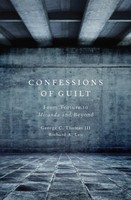New Book by Miranda Expert at Rutgers–Newark Law School Explores Thorny History of Police Interrogations and Confessions
NEWARK, NJ – It has been more than 45 years since the term “Miranda rights” became shorthand for new protections against self-incrimination for suspects in law enforcement custody. The common assumption is that, told of their right to remain silent and their right to counsel, most suspects decide not to talk to interrogators and are not subject to high-pressure questioning and harsh tactics. The 1966 U.S. Supreme Court decision Miranda v. Arizona thus represents a shining achievement in the evolution from torture to respect for the autonomy and dignity of the suspect.
The reality is much different, say Rutgers School of Law–Newark Distinguished Professor George C. Thomas III and Richard A. Leo, Professor of Law and Dean’s Circle Research Scholar at the University of San Francisco. In their new book Confessions of Guilt: From Torture to Miranda and Beyond (Oxford University Press, March 2012), they tell the story of how the law of interrogation has shifted over the centuries from indifference about extreme force to concern over the slightest pressure, and back again. The history of interrogation in the Anglo-American world is not a progression from more to less violence in obtaining confessions. It is instead, the authors reveal, “a pendulum rather than a continuum.”

From late 18th century England to America at the dawn of the 21st, Confessions of Guilt traces the history of interrogation practices, the laws that govern them, and the social dynamics that underpin the continual transformation of both. The book concludes with a look into the future of the law of interrogation, and the prediction of a divergence in the law as it applies to the investigation of ordinary domestic crime and the investigation of terrorism.
Professor Lawrence M. Friedman of Stanford Law School says of Confessions of Guilt: “This is a comprehensive and deeply researched book, which examines with insight and passion a particularly dark and murky corner of legal doctrine. It is an invaluable guidebook for scholars of crime and punishment.”
An internationally respected criminal law scholar, George Thomas is a prolific writer with an M.F.A. in creative writing as well as a J.D. from the University of Iowa. He is the author of The Supreme Court on Trial: How the American Justice System Sacrifices Innocent Defendants, Double Jeopardy: The History, the Law and co-author of The Miranda Debate (with Richard Leo) and Criminal Procedure: Principles, Policies and Perspectives (with Joshua Dressler), as well as more than 60 articles.
In 2009 Rutgers University, in recognition of his many contributions to criminal procedure scholarship, named Thomas a Board of Governors Professors, one of the university’s highest honors. The law school Alumni Association has selected Thomas as the recipient of its 2012 Distinguished Service Award.
Media Contact: Janet Donohue
973-353-5553
E-mail: jdonohue@andromeda.rutgers.edu